When Joe Schmidt was announced as Eddie Jones’ successor last month, many were pleasantly surprised.
Others, however, questioned what it said about Australia’s coaching pathways.
After all, Schmidt’s appointment meant he was the third foreigner out of the past six coaches to lead the Wallabies.
“It means we’re not doing a very good job, and we’re not doing a very good job on a number of fronts,” former Wallabies coach John Connolly said.
Another former Wallaby and coach commented: “We haven’t had too many candidates for a while … when you sack a Wallaby coach like they did with [Dave] Rennie and then Eddie’s gone within a year, and he pulls in a coaching team on short-term contracts, it creates a massive void because you chew through people. Some were good coaches, some were not. The system invested in them for six months and they’ll never be back.”
It was only two decades ago Australia’s coaches were sought after all over the world.
Now, New Zealanders dominate head coaching positions abroad, especially in Japan.
Australia’s list extends to one hand, with Dan McKellar the highest profile coach at Leicester Tigers. Peter Hewat is at Ricoh in Japan’s League One competition and Matt Cockbain has managed to steer his NTT Docomo side into the League Two division.
Michael Cheika’s next move remains to be seen, as does Andy Friend’s, while Les Kiss has returned to coach the Reds.
But, overall, Australians aren’t the sought after coaches they once were.
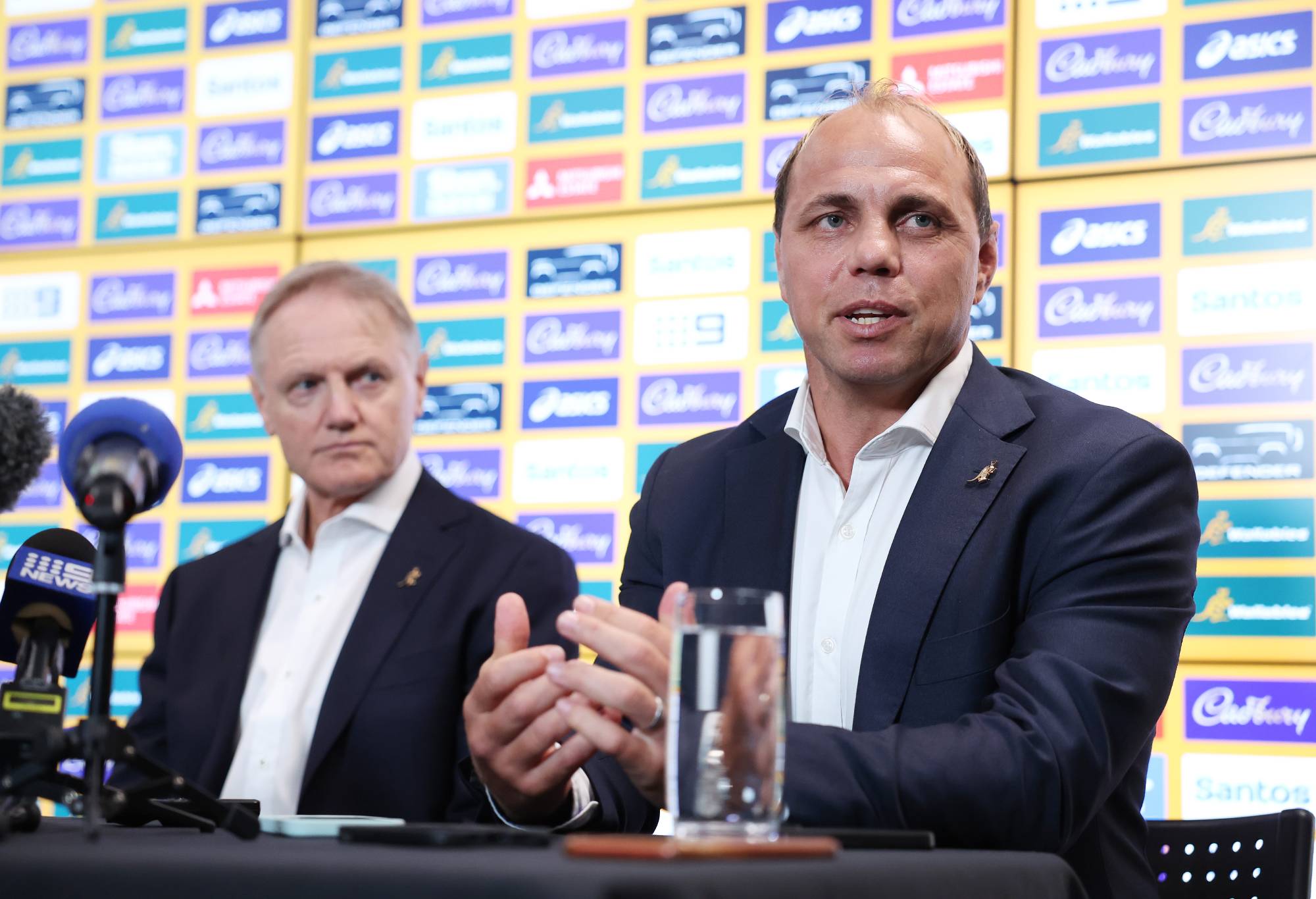
RA CEO Phil Waugh announced New Zealander Joe Schmidt would coach the Wallabies on January 19, 2024 in Sydney. (Photo by Mark Metcalfe/Getty Images)
Even at home, Australians have been increasingly looked over for Super Rugby roles over the past decade.
Indeed, it wasn’t long ago that Daryl Gibson (New Zealand) was at the Waratahs, his compatriot Brad Thorn coached the Reds and South African Dave Wessels, who was previously at the Force, was at the Rebels.
It meant the only locally raised coach in the Super Rugby system was McKellar at the Brumbies. Tim Sampson, who was later axed for New Zealand-born and raised Simon Cron, was at the Force.
It’s no surprise, therefore, that there were few local candidates to replace Jones when RA supposedly cast the net wide to find their next Wallabies coach.
“Where I’d start is if we’re not producing coaches of sufficient quality, that teams don’t think they can employ Australians as head coaches, then our system is failing, isn’t it?” respected coach Laurie Fisher said.
“Irrespective of how good their coaching is, you would hope that our systems are about producing quality Australian coaches.
“You might get the occasional assistant coach for a particular expertise, but that’s how I would judge the success or failure of our coach development systems, are we coaching homegrown talent? And we’re not consistently doing it, are we?
“There’s a lot of talk about the quality of the Shute Shield, then surely there’s the quality of the Shute Shield coaches – and it took them a long time to give Darren Coleman a go.”
Connolly, who led Stade Francais and Bath to finals after carving out a successful career with Queensland, was even more direct.
“The best coaches come from the best countries,” Connolly said.
“Our Super teams have been bad, our Wallabies have been really bad, so there’s obviously a coaching issue there and people aren’t going to invest in them. We’ve got to improve those areas.”
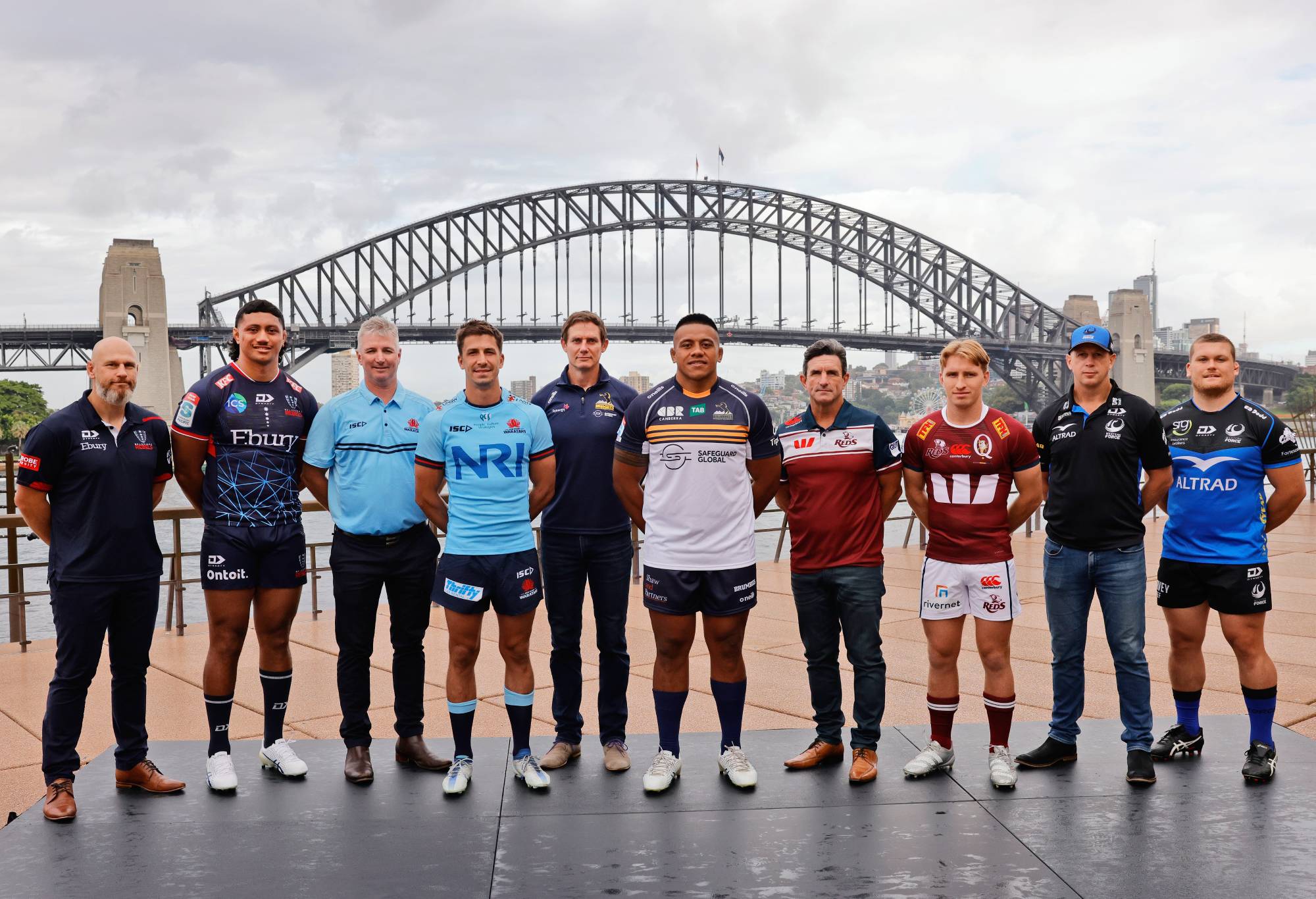
Who’s coaching Australia’s Super Rugby franchises is vital when looking at the Wallabies. (Photo by Jenny Evans/Getty Images)
Connolly isn’t wrong, the results paint an ugly picture with the Wallabies winning at less than 40 per cent since the 2015 World Cup and no Australian Super Rugby side making the final since 2014.
Last year, Australia’s Super Rugby franchises managed just six wins from 30 matches against their trans-Tasman rivals. The poor results ultimately led to the Brumbies being the only side in contention for the title, where they eventually bowed out in the semi-final.
But the tough showing in Super Rugby once again filtered through to the Wallabies, with Jones’ side becoming the first Australian team to fail to make the knockout stages.
It begs the question, is the standard of coaching playing a role in Australia’s poor results?
“It’s got to be part of the reason, doesn’t it?” Fisher said. “What percentage, I don’t know. But it’s certainly in the mix.
“Is it player quality? Is it coach quality? Is it the size of our base? Quality coaches, experienced coaching, makes a different without a doubt. You’d suggest there’s improvement in us, as there’s improvement in every area of Australian rugby.”
While the player drain overseas has been a subject spoken about heavily, with few answers to the problem, the coaching exodus has been – and continues to be – glossed over.
“I couldn’t agree more,” Friend said.
Several issues with coaching in Australia have reared their head since the Wallabies were the envy of the world at the turn of the century.
They extend to an unclear pathway, lack of mentorship, low remuneration, and an inability to get tenure out of coaches, which exacerbates the need to move to a centralised system.
One former Wallaby and coach, who wished to stay anonymous, was scathing about the environment created for people to go into coaching.
“The fundamental issue for professional coaching in this country is we don’t pay our coaches enough money and, two, we don’t assess our coaches based on the right factors,” he said.
“If we only ever look at the results a coach gets, ‘we say, this coach is unsuccessful, so let’s sack him’ and, therefore, we don’t get tenure out of our coaches and because we don’t pay them enough, and we don’t give them tenure, people who could be good coaches basically go, ‘no thanks.’ There’s no point being in this career because I don’t get paid well, it’s a highly stressful job and I don’t get any real guarantee over my tenure, so why would I bother?
“That’s largely why we’ve seen an economy like Australia’s, where people aren’t incentivised to go into coaching.
“That’s why we don’t always select the best people and until we address those fundamental issues, we’re going to be excluding people who could be very good at coaching.”
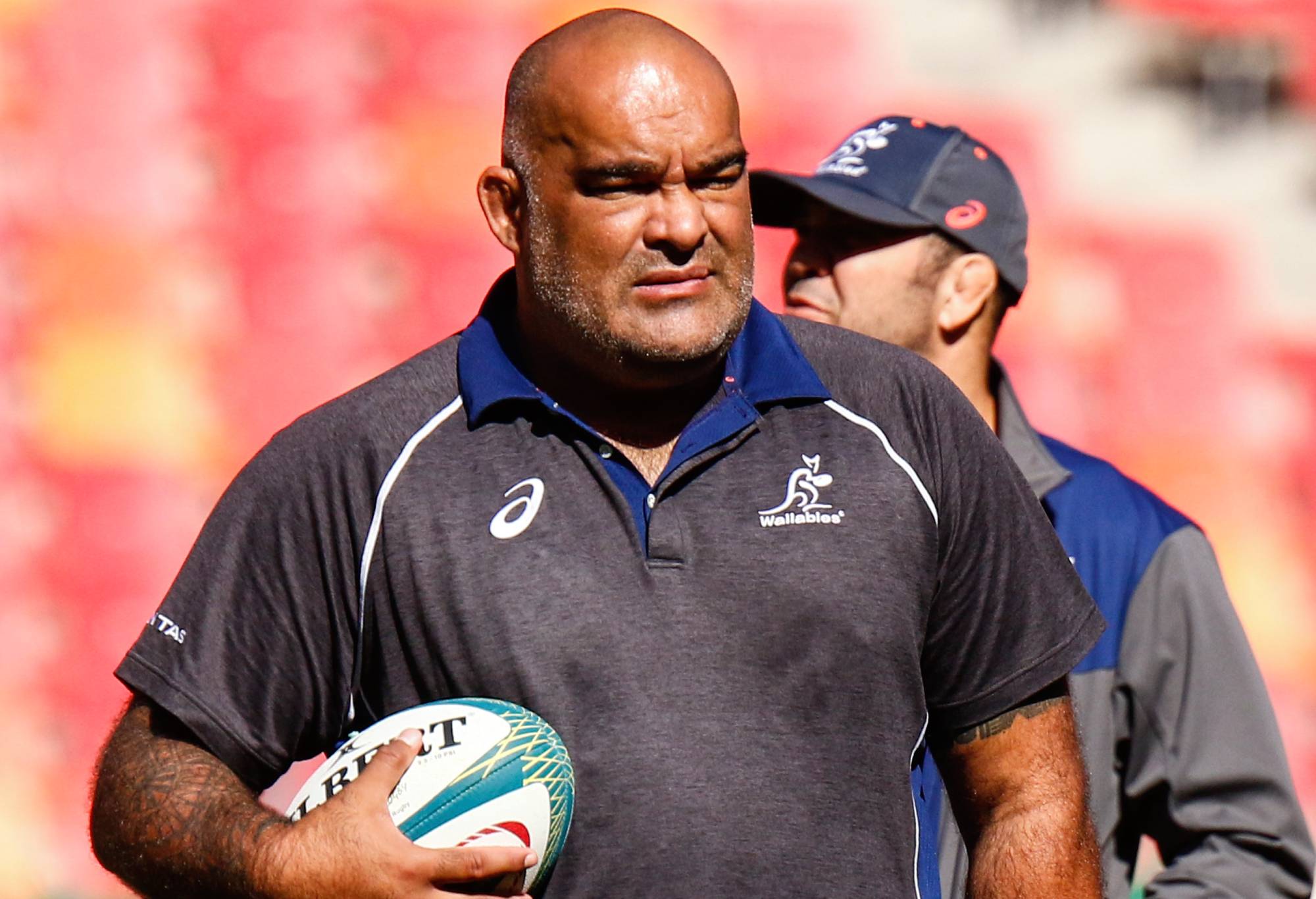
Australian-raised Simon Raiwalui coached with the Wallabies for 18 months but quickly fell out of the Australian coaching system. (Photo by Michael Sheehan/Gallo Images/Getty Images)
Several coaches, particularly those who were assistants, said they left rugby because they could earn more elsewhere.
“To be an assistant coach in Sydney, we keep talking about high performance systems in Australia but nothing about it is high performance, no one gets paid high performance money,” said former Waratahs and Wallabies assistant Chris Malone.
“I’m not just talking about money, you want to progress, but I look across the board now and you have people who get these jobs because they’re so keen and willing rather than being incentivised.
“I stepped away when it became apparent that I wasn’t the next guy in line for the head coach’s job because, at the time, a fair few Kiwis were running the show.”
Sean Hedger, who started coaching in the 1990s and led Sydney University to a title in 2022 before stepping away from the role because it wasn’t feasible to remain there, said it was definitely a factor.
“To make a living? Yep. It’s definitely would be a contributing factor,” he said. “It probably leads to the lack of people aspiring, that’s the sad fact.”
Shaun Berne, who joined Michael Cheika’s Wallabies coaching team in 2019 but left professional coaching less than two years later, agreed and said he had to put his family first.
One example of the unclear coaching pathway and the brutal nature of the career is last year’s Queensland Reds assistant Mick Heenan.
After his huge success with Queensland University, Heenan joined Brad Thorn’s coaching team last year.
Yet, he lasted just one year as Thorn stepped down and Les Kiss, who built an impressive resume overseas over the previous 15 years, was given the top job and brought with him his assistant coaches.
“I feel very sorry for him (Heenan),” Connolly said. “He deserved his shot at the time. He’s been crucified in Queensland. Someone who’s won six or seven premierships. No problems with Les, but the other bloke deserved a shot.”
Hedger, who has spent several years coaching in Japan to try and carve out a career, said there was no natural pathway.
“For a pathway to be clear, you’ve got to have succession and see people progressing but I don’t think that happens enough in Australian rugby,” he said.
“Club to Super Rugby to national level should be the logical pathway, but I don’t think that pathway occurs very often.
“Because it isn’t centrally coordinated in any way, and each province, when they change a head coach there is generally a cleanout of the assistants as well, so that sort of hinders the progression and pathway. Mick Heenan’s a great example.
“The lack of coordination speaks to Rugby Australia’s desire to go to centralisation. That (pathways) can become a good part of a centralised model, it doesn’t guarantee you a role, but you get a better opportunity to progress and improve with each level instead of being shoved around, or finding yourself out of employment and then having to look overseas.”
Heenan isn’t the only person to fall out of the Australian coaching system quickly, with former Wallabies coach Ewen McKenzie barely seen since resigning in 2014.
Other Wallabies assistants like Michael Foley, Andrew Blades and Tony McGahan have come and gone too. While Mick Byrne and Simon Raiwalui weren’t encouraged to stay in the system following the 2019 World Cup either.
Going back even further, Ian Kennedy, the former Australian under-21s coach, lasted just one year at the Waratahs when he took over in the early 2000s.
Kennedy had quit the police service to take over the Waratahs. But when player power saw him removed, Kennedy was left without a job.
It’s meant several intellectual minds have been lost to Australian rugby.
“I think it’s a coaching crisis,” Hedger said. “The coaching space within Australian rugby, I wouldn’t call it healthy.
“We seem to have a bad habit in Australia rugby that when coaches progress up through the national level and go out of the national window, they get lost to the game. Ewen McKenzie is lost to the game, Tony McGahan was an assistant with the Wallabies and head coach at the Rebels, and is now a director at Gregory Terrace and doesn’t have much to do with rugby. I could keep going.
“Whereas (New Zealanders) Graham Henry, Wayne Smith, Mike Cron, they’re constantly giving back to the game. We seem to lose people at both ends.”
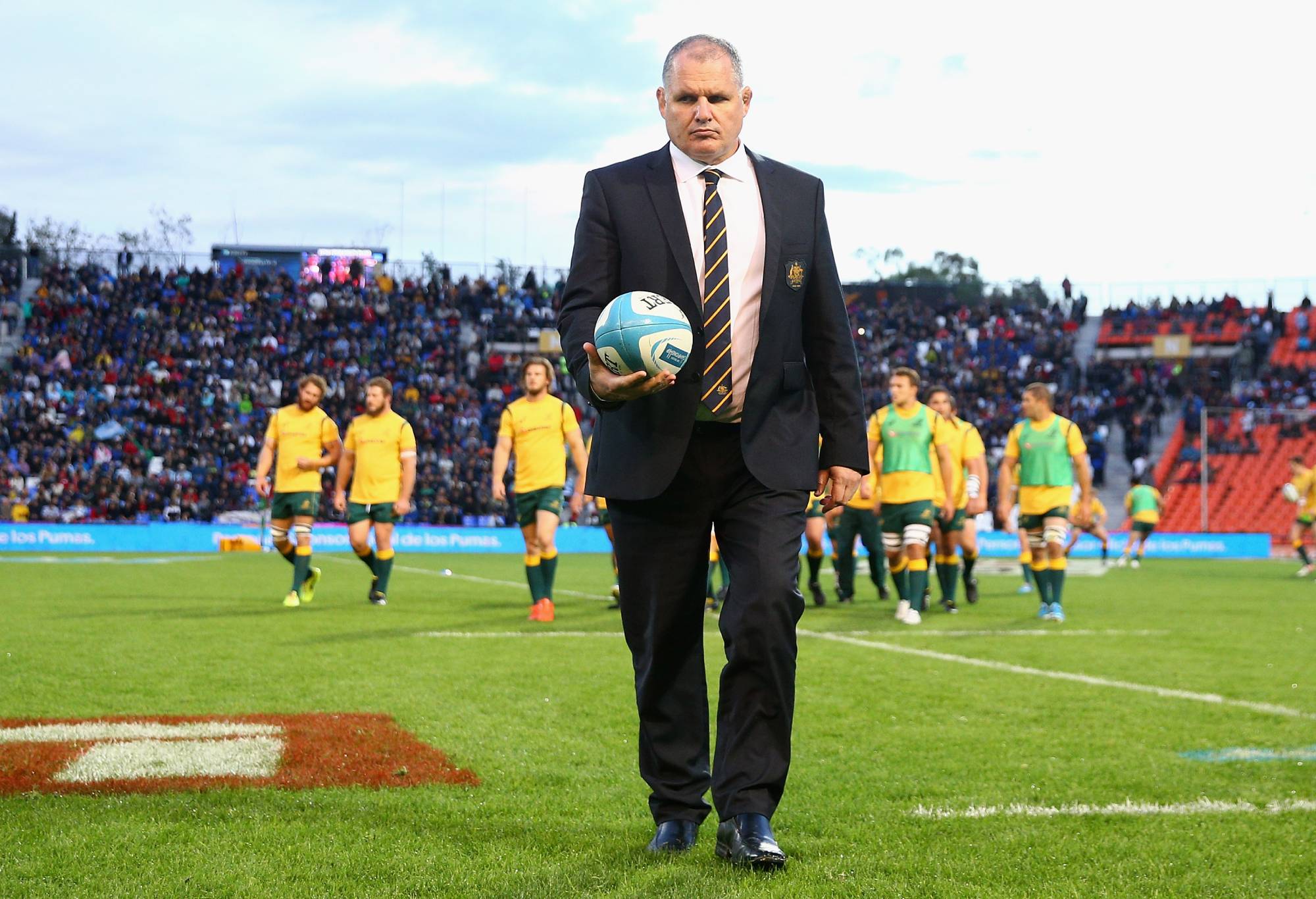
Ewen McKenzie coached the Wallabies for less than 18 months before resigning and being lost to Australian rugby. (Photo by Cameron Spencer/Getty Images)
Indeed, as one recent Wallabies assistant highlighted, New Zealand rugby doesn’t just throw coaches on the scrap heap if they don’t succeed at one club.
“The difference that I see between Australia and New Zealand is the fact that New Zealand back their coaches,” he said.
“Someone like Tana [Umaga], who wasn’t great at the Blues, they didn’t just fuck him off.
“He said, I’m happy to go back into a defensive role. He learnt where he had some shortcomings and now he’s back in charge of Moana Pasifika.
“This is where your central contracting is important.
“The first people you’re contracting are your coaches and your head of strength and conditioning. Then you’ve got no excuses at a national level, and then there’s a safety net where you can move coaches around – you’ve actually got an investment with them, and if it’s not domestically, what you do is you find a place overseas, you place them there, which the New Zealanders do fantastically well.”
Nathan Grey, the former World Cup winning Wallaby, is one of the exceptions.
A long-time assistant under Michael Cheika, Grey has coached the Junior Wallabies in recent years since the 2019 World Cup.
Friend went as far as saying there’s been “no pathway”.
“Way back when RUPA started, we should have had a RUCA – Rugby Unions Coaches’ Associations – but there was no such thing,” he said.
“I pushed that in 2003. There’s never been one. That was in 2004, so 20 years later we’re still sitting here with no support for coaches, no apparent pathway for coaches, and hence we’re in a situation where we’re at. To me, it’s not surprising. It’s disappointing.
“I’ve said this for some time, there’s four pillars in rugby. There’s the players, coaches, referees and administrators. If one of those four pillars is not focused on, then you struggle. If two of those pillars aren’t focussed on, then you really struggle. And if you get to where three of those pillars aren’t really promoted, you end up pretty much where we are.
“We’ve had one pillar that’s been being supported in the pro game – and that’s been the players.
“Everyone asks, how did we get ourselves in the situation? Well, here we go. There’s a strong focus on referees now, which is good. Is there one on administrators? I don’t know. But there’s certainly not on coaches.”
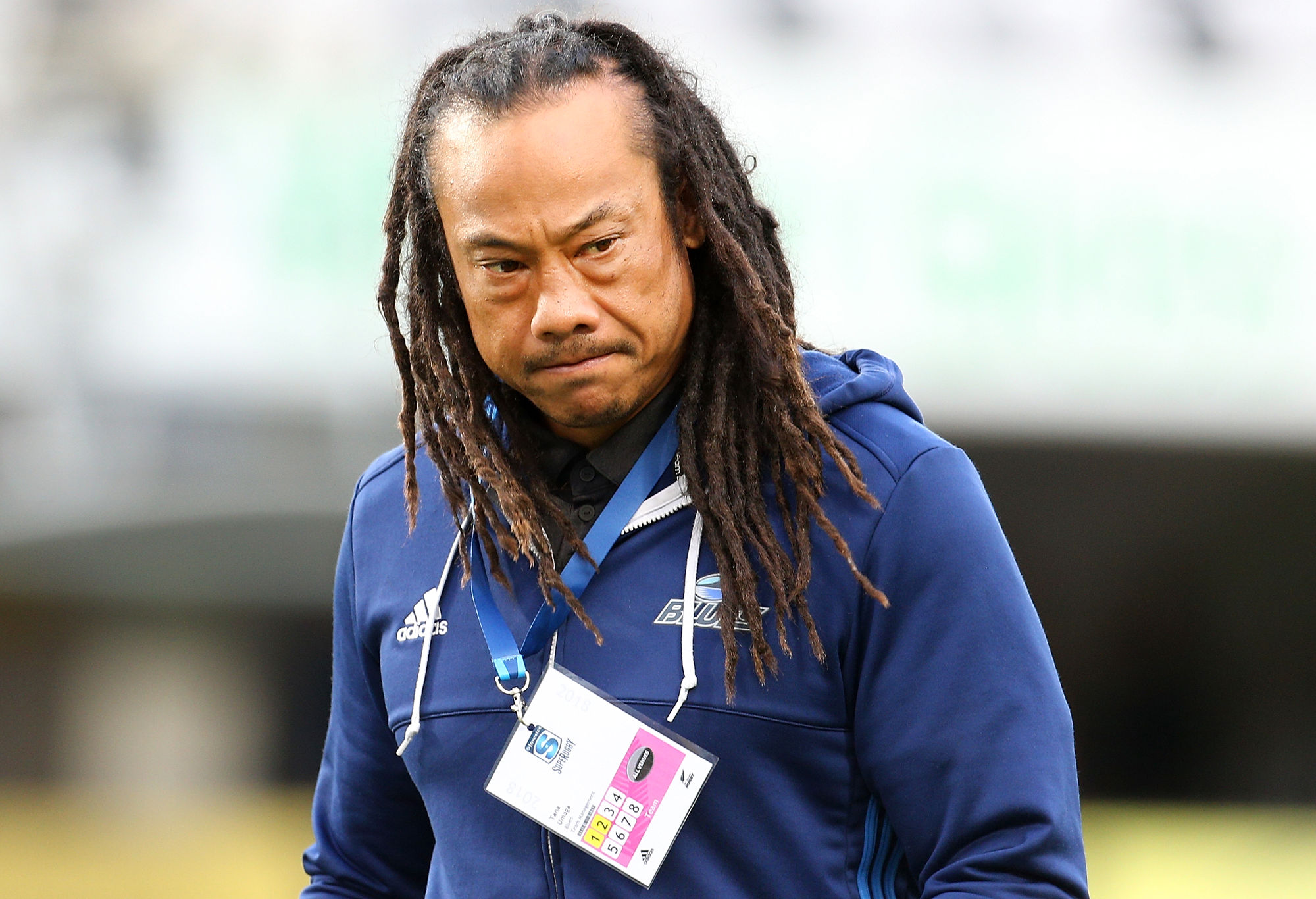
Tana Umaga was the head coach of the Blues before shifting back as an assistant, and has now been appointed Moana Pasifika’s coach. (Photo by Dianne Manson/Getty Images)
How coaches are judged is another factor contributing to the malaise in coaching in Australia.
As one respected figure said, more often than not the Rugby Australia board, as well as boards across Super Rugby programs, are filled by people with little to no experience in high performance sport.
“They need to resolve the issue of who employers the coaches and how do we measure their performance,” the former coach said.
“Until that’s resolved, there’s no point spending money in the area.
“How do we assess our coaches, what are the KPIs? There’s no set formula.
“The Kiwis have a different formula. They measure the KPIs of their coaches of which 25 per cent of the KPIs are geared around the performance of the team. Only 25 per cent is about performance.
“I could tell you pretty much which teams most years will make the final four. That means there’s eight others that won’t make it to the semi-finals.
“But if we throw those coaches away, we won’t get anywhere. This is one of the systematic things that need to change in this country. We can either not invest in coaching and not effectively measure coaches, we’ll continue to burn our coaches.”
Friend agreed, saying results often camouflage the success some coaches have in particular areas.
“The way we’ve looked at it has been through the wrong lens, but I can’t see that changing soon,” he said.
At an amateur level, several figures like RA’s community coach Michael Magriplis, as well as the various state coach development managers like Sam Norton-Knight, are doing their bit to try and upskill coaches.
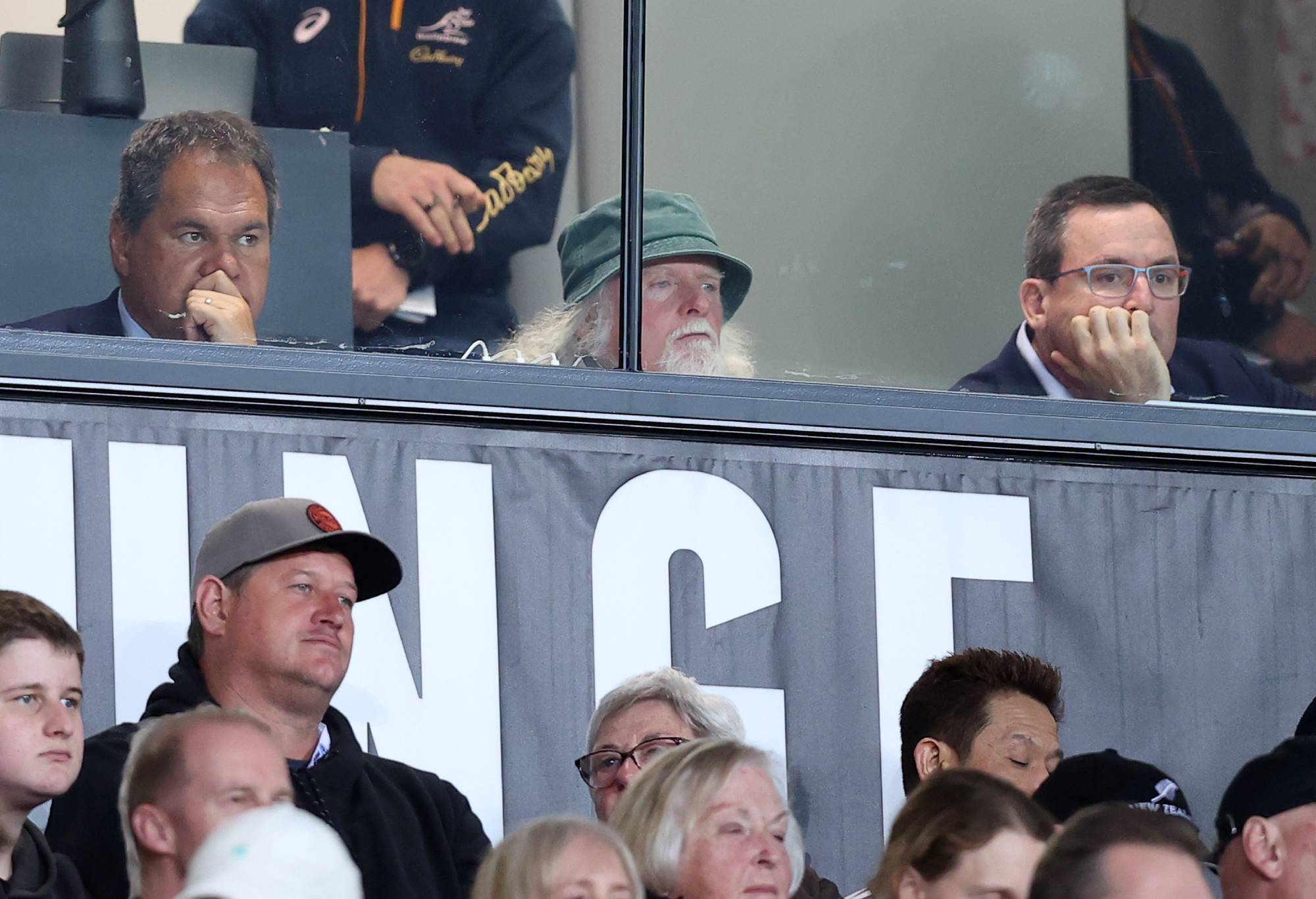
Laurie Fisher (C) believes Australia’s coaching system is failing if they continue to turn to foreign coaches. (Photo by Phil Walter/Getty Images)
Nudgee College recently hosted another successful coaches forum too, which showcased the deep appetite for coach education.
“These are junior coaches, school coaches; what an incredible number of people with a thirst to go to a coaching course and improve what they can offer to their athletes,” said Fisher, who presented at the sold out forum that attracted 300 attendees.
“Places like Nudgee, I think there’s something in Perth they’re trying to get underway, but there’s a genuine thirst for coaching education.”
He did, however, acknowledge that “there’s a lot more that they can do.”
Nick Stiles, the Rebels general manager and former Queensland Reds coach, said the absence of a third-tier like the National Rugby Championship was hurting coaches as much as players.
“It’s difficult to bridge the gap at the moment – that’s the issue,” he said.
“Since we’ve lost the third tier with the NRC, we haven’t had the game time together and we’re also not developing the next tier of coaches and officials.
“For me, that’s the biggest issue is we don’t have this third tier to provide opportunities for the players, coaches and officials. It’s an issue.”
Others like Connolly, as well as several other coaches, said it was imperative a national club competition was introduced to help “bridge the gap” and provide greater opportunities for coaches.
“I’d have a national club comp running for six weeks. More games, higher intensity, better coaching, and there will be pressure on the coaches, and that will flow through to the Australian level,” Connolly said.
“Primarily, we’ve got the structure not wrong, but very wrong in Australia. We have club competitions that start months after Super Rugby starts, that’s fundamentally wrong.
“We haven’t developed coaches terribly well, and it starts in the schools and clubs and Rugby Australia has to take a lot of blame for that.”
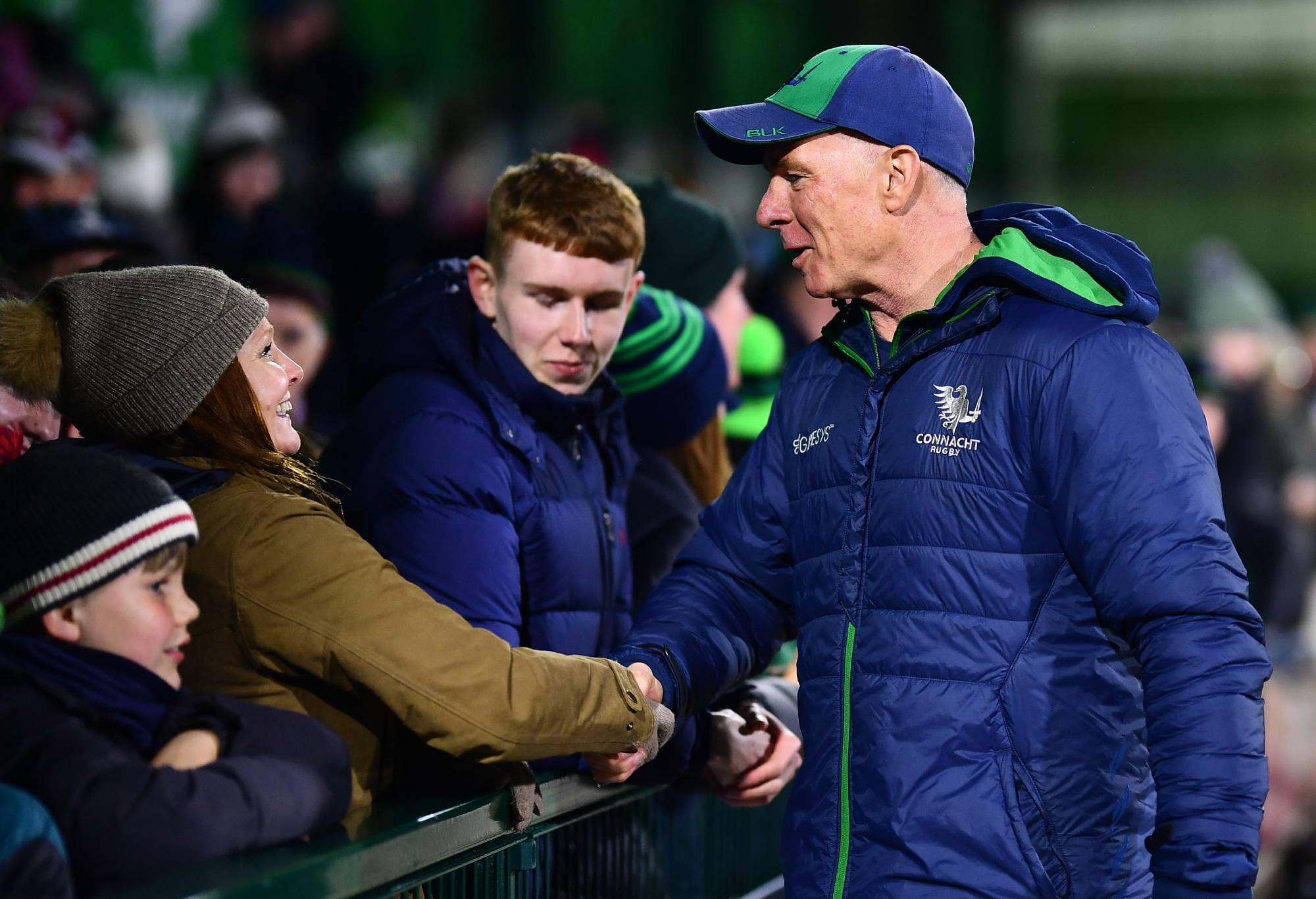
Former Connacht director of rugby Andy Friend believes more needs to be done to ensure coaches are supported. (Photo By Ben McShane/Sportsfile via Getty Images)
Mentorship is the other great missing piece in Australian rugby, according to several coaches.
“The greatest benefit in coaching has always been mentorship,” a former Wallaby and coach said.
“Someone mentoring young coaches. Older coaches mentoring younger coaches. That concept has stood the test of time and formalising that role of mentorship would allow the growth of coaches.
“The Kiwis have a very formalised mentorship and in a very simplistic way.
“Let’s say we have 30 professional coach, each one of you need to mentor five other coaches, and they might be club coaches or school coaches, but part of your role as a professional coach is to mentor. Here is how we’ll manage the program, here’s how we’re going to analyse, and it’s going to be centrally managed. We would then have 150 coaches. Coaching is all about constant learning, information transfer, people challenging ideas. It’s just thought. Coaching is thinking.
“It’s not difficult. We can solve these problems without any excess money. All it requires is management and leadership and people to provide direction.
“You just think of the benefit over five years of having 150 coaches in a formalised learning and mentor program. Then we’re not thinking who our next coach is, we know because they’re already in the program.”
Malone added: “My greatest development came as a player. Scotty Wisemantal was my coach when I was in the Australian Institute of Sport and my coach development, it came from time in the saddle but people like him that I’d talk to and put meat around some of the thoughts that I had.”
Friend, who returned home to Australia recently after five seasons at Connacht, reiterated the need for Australia’s coaches to be supported.
“There is a massive need for coaches to be supported,” he said.
“It needs to be coming from within, but it’s not.
“We need well-being in our game, of course we do, but no one ever looks at the coach. No one ever looks at that bloke, who’s got the most pressure. And when failure happens, all eyes go to the coach and he’s the bloke who gets flicked? What’s happening to him? Who’s looking after that bloke? Where does he then go?”



































































































